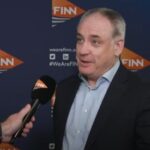Announcing £6.6 million funding for a range of international science partnerships and STEM education projects at the opening of this year’s Space Comm-Expo in Farnborough, Dr Paul Bate, CEO of the UK Space Agency, highlighted the importance of collaboration and education to the development of the UK space sector.
Speaking about the £2.3m Science and Exploration Bilateral Programme that will support science collaborations with international institutions, Dr Bate said, “Those bilateral programs bring space to life and allow us to do more than we can do as any one country.”
Dr Bate also outlined how the £4.3m grant for Space to Learn programme will be spent on supporting STEM education and helping children be inspired and to learn more about science, technology, engineering and maths, using space as a catalyst for that.
Space heritage
He also talked about the space heritage in the UK – more satellites are built in Scotland than in the entirety of Europe – and how the government is there to help enable and build the infrastructure that allows companies to develop and allows that inspiration of space to come through into people’s daily lives, from exploration and discovery to focusing on climate change. “Over half the data that we need to really understand climate change is coming from space,” he said.
Embracing failure
Dr Bate also explored the less successful projects such as the Virgin Orbit shutdown in January and the lessons that can be learned from these failures. He commented, “Space is hard – but what did we show? We showed that the UK has the capability, we have an operational spaceport and of course we will go again. Next year we’ll see launches vertically from Scotland both from the Shetland islands and the top of the mainland at Sutherland Spaceport.
“We have shown we are space capable and launch capable, now we move to the successes and onwards cadence of launches as we become the leading provuder of small satellite launches across Europe.”
Subscribe to the FINN weekly newsletter

